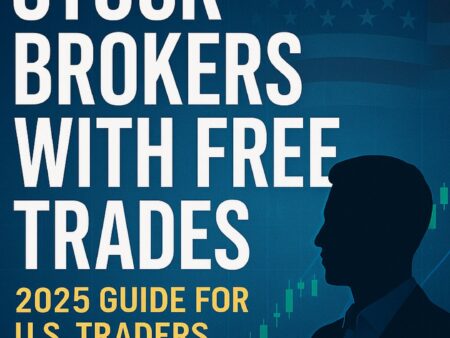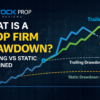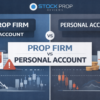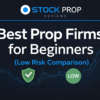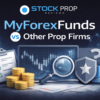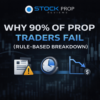Choosing the right trading platform is one of the most important decisions any trader will make. Whether you’re opening your first brokerage account or upgrading to a more advanced system, your platform directly impacts how you analyze markets, place trades, and manage risk.
In today’s world of stock brokers USA, there are dozens of platforms competing for your attention. Some are designed for trading for beginners with simple mobile apps and no commissions. Others are powerful systems built for professionals, offering complex tools, algorithmic trading, and global market access.
This guide breaks down the differences between beginner trading platforms and advanced trading platforms so you can decide which one is right for you. We’ll compare features, costs, and user experiences, then highlight an alternative option for those who want to trade with little or no starting capital: prop firms like TradeThePool.
Why Trading Platforms Matter
Your trading platform is the bridge between you and the financial markets. It determines:
- How quickly you can place orders
- What types of assets you can trade (stocks, ETFs, options, crypto, futures)
- What research and charting tools are available
- Whether you can practice with paper trading
- The overall cost of your trades
The wrong platform can hold you back, while the right one can help you grow as a trader.
Beginner Trading Platforms: Simple and Accessible
Beginner trading platforms are designed for new investors and traders who value simplicity, affordability, and accessibility.
Key Features:
- Zero or low commissions (popular among low commission brokers)
- Easy-to-use mobile apps and websites
- Basic stock and ETF trading
- Fractional shares for small accounts
- Limited but clear educational tools
Examples of Beginner Platforms:
- Robinhood – Mobile-first, commission-free trading with crypto access.
- Webull – User-friendly charts and extended-hours trading.
- Fidelity – Great for beginners who also want retirement account options.
Pros:
- No high costs or barriers to entry
- Fast account opening and instant deposits
- Ideal for small accounts
- Clean interfaces for stress-free navigation
Cons:
- Fewer advanced order types
- Limited research tools
- Not ideal for professional traders
- Often mobile-focused (desktop tools can be limited)
Advanced Trading Platforms: Powerful and Professional
Advanced platforms cater to active and professional traders who require speed, customization, and market depth.
Key Features:
- Complex charting and technical analysis tools
- Options, futures, forex, and global stock trading
- Algorithmic and API trading capabilities
- Advanced order routing and execution
- Professional-level data feeds
Examples of Advanced Platforms:
- Interactive Brokers (IBKR) – Global access with the lowest margin rates.
- Thinkorswim (by TD Ameritrade) – Advanced charting, paper trading, and options tools.
- TradeStation – Known for backtesting and automation.
Pros:
- Professional-grade analysis and execution
- Access to multiple asset classes worldwide
- Superior customization and automation
- Research, screeners, and trading communities
Cons:
- Higher learning curve
- Monthly data or subscription fees possible
- Requires larger deposits for margin accounts
- Can overwhelm beginners
Beginner vs Advanced Trading Platforms: Comparison
| Feature | Beginner Platforms (e.g., Robinhood, Webull) | Advanced Platforms (e.g., Interactive Brokers, Thinkorswim) |
|---|---|---|
| Commissions | $0 stock & ETF trades | $0 stock/ETF (options ~$0.65 per contract) |
| Ease of Use | Very simple, app-based | Complex, requires learning curve |
| Asset Access | Stocks, ETFs, some crypto | Stocks, ETFs, options, futures, forex, global markets |
| Charting & Tools | Basic, limited indicators | Advanced charting, strategy testing, APIs |
| Account Minimum | $0 | Varies ($0–$2,000+) |
| Best For | Beginners, casual investors | Active day traders, professionals, global investors |
Pricing & Commissions
One of the biggest differences between beginner and advanced platforms is the cost of trading.
- Beginner Platforms:
- $0 commissions on stocks and ETFs
- Options typically $0–$0.55 per contract
- No account minimums
- Advanced Platforms:
- $0 commissions on stocks/ETFs (most brokers now)
- Options ~$0.65 per contract
- Futures/forex require additional costs
- Margin rates are lower (IBKR ~6.8% vs Robinhood ~12%)
User Experience Insights
- Beginners: Want fast, easy access without getting lost in advanced features. Platforms like Robinhood or Fidelity offer a smooth entry point.
- Advanced Traders: Need speed, deep market data, and professional tools. Platforms like IBKR or Thinkorswim deliver.
Which Type of Platform Is Right for You?
Ask yourself:
- Are you just learning how to trade? Start with a beginner-friendly broker.
- Do you trade daily or use technical strategies? Choose an advanced platform.
- Do you want retirement accounts along with trading? Fidelity or Schwab are great.
- Do you need global access and leverage? Interactive Brokers or TradeStation are better fits.
Prop Trading: An Alternative for Capital-Limited Traders
Discount brokers and advanced platforms are great—but what if you don’t have the capital to start?
Many traders are also exploring TradeThePool stock prop firm in 2025 — these stock prop firms fund traders, so you can trade with little or no deposit.
Why Prop Firms Are Growing Popular:
- No large deposit needed when trading with a prop firm
- You trade with company capital after passing an evaluation
- Profit splits allow you to keep a percentage of gains
- Prop firms help you get funded to trade remotely
➡️ Check out TradeThePool to see how you can start trading with funded accounts.
FAQ: Beginner vs Advanced Trading Platforms
1. What’s the main difference between beginner and advanced trading platforms?
Beginner platforms focus on ease of use and affordability, while advanced platforms provide professional tools and global access.
2. Can I switch from a beginner to an advanced platform later?
Yes, many traders start with Robinhood or Webull and later move to Interactive Brokers, Thinkorswim, or TradeStation.
3. Are advanced platforms more expensive?
They may charge for data feeds or advanced tools, but commissions are often the same as beginner brokers.
4. Which platforms are best for day trading?
Webull (for beginners) and Interactive Brokers or Thinkorswim (for advanced traders).
5. Do beginner brokers offer retirement accounts?
Yes—Fidelity and Schwab both offer IRAs with $0 commissions.
6. Can I trade options on beginner platforms?
Yes, but advanced brokers offer more tools for complex strategies.
7. Is a prop firm better than a beginner broker?
Not necessarily—it depends on your capital. Prop firms like TradeThePool are ideal if you want to trade with little or no deposit.
Final Thoughts
Both beginner and advanced trading platforms have their place. If you’re just getting started, a simple, mobile-first broker makes sense. As your skills grow, you may need the power of an advanced system.
But remember—if you don’t have capital, prop trading firms offer another path.
👉 Want to start trading without using your own money? Explore the top-rated stock prop firm tradethepool.com.
